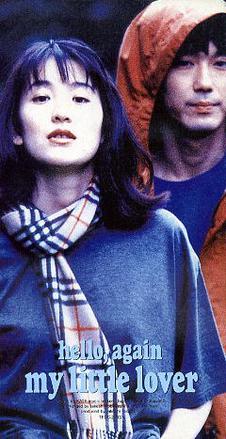Yuki Kuramochi, known professionally as Yuki, is a Japanese musician and singer-songwriter. She is best known as the lead vocalist for Judy and Mary. She founded Judy and Mary in 1991 and became a solo artist in 2002. She has also been a member of the bands NiNa and Mean Machine.
"This Is Love" is Hikaru Utada's first Japanese digital single. It was released on May 31, 2006 as a promotional single for her fourth Japanese studio album. "This Is Love" was tied-in as the CM song for a Nissin cup noodle campaign and the opening theme for an anime "Freedom," which was also tied into the Nippon campaign. The digital single reached number one in virtually every online music store in Japan prior to the ULTRA BLUE album's release, including the most used store in Japan, iTunes Japan, as well as OnGen, among others. Utada herself is quoted to have said that this song is about expressing that "Love is like a mix of extremes: anxiety and peace."

"Prisoner of Love" is Hikaru Utada's 21st Japanese single and 30th single overall, and was released on May 21, 2008. This was her first Japanese recut single in nine years, after the first one "First Love" in 1999. It is also her first single to be released only in CD+DVD format. "Prisoner of Love" serves as the insert song for the Japanese television drama, Last Friends, while the original version is used in the opening theme. It won the Best Theme Song Award in the 57th Drama Academy Awards. "Prisoner of Love" was the 3rd most downloaded song in Japan during 2008.
"Eternally" is a song by Japanese musician Hikaru Utada, from their 2001 album Distance. It was re-arranged in 2008 as "Eternally (Drama Mix)" for use in the Maki Horikita starring Fuji TV drama Innocent Love. It was released as a digital single on October 31, 2008, and eventually released onto CD in March 2009, on an EMI compilation album I: Zutto, Zutto, Aishiteru (i(アイ)~ずっと、ずっと、愛してる~).
The discography of Japanese contemporary R&B singer and Thelma Aoyama consists of seven studio albums, six compilation albums, one extended play, one remix album, one cover album, two video albums and numerous solo and collaboration singles. Aoyama debuted as a musician in 2007 under Universal Music Japan, and became famous through her collaboration song with rapper SoulJa, "Koko ni Iru yo". Aoyama's version "Soba ni Iru ne" became one of the most successful songs of all time in Japan, certified for three million ringtone downloads and three million downloads by the RIAJ.
Hilcrhyme is a Japanese two member hip-hop group. The band's name is a pun on the Japanese pronunciation of hillclimb and the word rhyme. They are best known for their 2009 hit song "Shunkashūtō", which has been certified for 1,000,000 cellphone digital downloads and 1,000,000 ringtone downloads separately. The group was named the New Artist of the Year at the 24th Japan Gold Disc Awards.
SoulJa is a Japanese hip-hop musician and songwriter best known for his collaborations with singer Thelma Aoyama, "Koko ni Iru yo" and "Soba ni Iru ne" – the latter of which was the former Guinness World Records holder for the best selling digital single of all-time in Japan.
Lil'B is a Japanese female pop duo, consisting of singer Mie and rapper Aila. They debuted in 2008 with "Orange," the 15th ending theme song for the anime Bleach. They are best known for their song "Kimi ni Utatta Love Song," which topped the RIAJ's monthly ringtone chart in 2008. They are also well known for their single "Tsunaida Te", which was the 3rd ending theme song for the anime Fullmetal Alchemist: Brotherhood.

To Love is Japanese R&B singer-lyricist Kana Nishino's second studio album. It was released on June 23, 2010, by SME Records. The album spawned four Oricon Top 10 singles, "Motto...", "Dear.../Maybe", "Best Friend" and "Aitakute Aitakute".

Suki de, Suki de, Suki de./Anata dake ga(好きで、好きで、好きで。/あなただけが / Love, Love, Love./Only you) is a single by Japanese R&B/pop singer Koda Kumi. It is a concept single, featuring three different ballads with three different music videos. The B-side of the single, walk ~to the future~, is a re-arrangement of walk from Kumi's 2002 debut album, affection.

"Hello, Again " is a song by Japanese band My Little Lover. It was released as a single on August 21, 1995, and is currently the band's biggest hit single.

"Hotaru/Shōnen" is the twenty-sixth single by Japanese artist Masaharu Fukuyama. It was released on 11 August 2010.

"Kimi tte" is a song by Japanese pop singer Kana Nishino. It was released as her 12th single on November 3, 2010. The song was marketed as a "heart-warming tender" mid-tempo ballad in the initial press release, also describing the lyrics as being about "scaling up passion to love."

"Ai o Komete Hanataba o" is a song by Japanese pop-rock act Superfly. Used as Edison no Haha's theme song, "Ai o Komete Hanataba o" was released as the band's fourth single on February 27, 2008. The song was Superfly's break-through single, breaking into the Oricon physical singles chart's top 20. As of 2011, it is Superfly's most successful single, being certified as a million ringtone download, triple platinum as a cellphone download, and single platinum for digital sales.
The discography of Monkey Majik consists of thirteen studio albums, five compilation albums and numerous singles and digital downloads. The band's releases were originally self-released in Sendai, after which they were signed to independent label and management Under Horse Records, and released material through there between 2004 and 2005. In 2005, Monkey Majik were signed to major label Avex Entertainment, and continue to release under the Binyl Records sub-label.
The discography of Japanese pop singer Kana Nishino consists of seven studio albums, six compilation albums, thirty-four singles and ten video albums. Nishino debuted in 2008 under Sony Music Japan, and gained national recognition with the singles "Tōkutemo" and "Kimi ni Aitaku Naru Kara" (2009). Nishino has released some of the most digitally successful songs in Japan: "Motto..." (2009), "Dear..." (2009), "Best Friend" (2010), "Aitakute Aitakute" (2010), "If" (2010) and "Kimi tte" (2010), all of which were certified million by the RIAJ.
The discography of Japanese pop and jazz vocalist Juju consists of six studio albums, four tribute albums, two extended plays, two live albums, five video albums and numerous singles. Juju debuted as a singer in 2001, collaborating with artists such as DJ Masterkey, Spontania and worked on the soundtrack for the film Kyōki no Sakura.
The discography of Japanese pop group AAA includes eleven studio albums, six extended plays, seven compilation albums, eight live albums, one cover album, three remix albums, and 52 singles. All of the group's releases have been with Avex Trax, a subsidiary of Avex Group.







